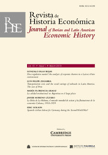
Revista de Historia Economica
Scope & Guideline
Connecting Historical Contexts with Economic Realities
Introduction
Aims and Scopes
- Economic Transformation and Institutional Change:
The journal explores significant economic transformations across different historical periods, particularly focusing on institutional changes that shaped economies in Spain and Latin America. - Quantitative and Qualitative Analysis:
Research published in the journal employs both quantitative data analysis and qualitative historical narratives, allowing for a multifaceted understanding of economic issues. - Regional and Comparative Studies:
The journal emphasizes studies that compare different regions (such as Spain and Latin America) or historical periods, facilitating a comprehensive understanding of economic development patterns. - Public Finance and Economic Policies:
A core area of focus is the analysis of public finance, taxation, and economic policies, particularly how these have influenced social structures and economic outcomes. - Social Aspects of Economic History:
The journal includes research that examines the social implications of economic changes, including inequality, labor relations, and the impact of economic policies on different social groups.
Trending and Emerging
- Impact of Globalization on Local Economies:
Recent publications are increasingly examining how globalization has influenced local economies in Spain and Latin America, highlighting the interconnectedness of regional and global economic systems. - Economic Inequality and Social Mobility:
There is a growing emphasis on studies that analyze economic inequality and social mobility, particularly in the context of historical transformations and policy implications. - Economic Responses to Crises:
Research focusing on economic responses to various crises (financial, political, or health-related) has gained traction, reflecting a broader interest in understanding resilience and adaptation in economic history. - Historical Perspectives on Public Health Economics:
The relevance of public health in economic history is becoming more prominent, with studies exploring the economic implications of health policies and practices throughout history. - Cultural and Gender Dimensions of Economic History:
Emerging studies are increasingly addressing cultural factors and gender dimensions within economic history, reflecting a more inclusive approach to understanding economic phenomena.
Declining or Waning
- Colonial Economic Structures:
Research focusing specifically on colonial economic systems and their immediate impacts seems to be less frequent, indicating a potential shift towards post-colonial studies or contemporary issues. - Traditional Agricultural Studies:
There is a noticeable decline in studies solely dedicated to traditional agricultural practices, suggesting a shift towards more modern economic analyses and industrialization effects. - Purely Descriptive Historical Narratives:
The journal appears to be moving away from purely descriptive narratives of economic history, favoring more analytical and data-driven approaches that provide insights into economic mechanisms.
Similar Journals

Revista Notas Historicas y Geograficas
Unveiling the Rich Tapestry of Latin America's PastRevista Notas Historicas y Geograficas is an esteemed academic journal based in Chile, published by UNIV PLAYA ANCHA CIENCIAS EDUCACION. With an ISSN of 0717-036X and an E-ISSN of 0719-4404, this journal has been a pillar of open access scholarly communication since 1984, fostering the dissemination of research in the fields of history and geography. As of 2023, it has achieved remarkable standings within the Scopus database, ranking 271st among 1,760 in the History category (84th percentile) and 597th among 821 in Geography, Planning, and Development (27th percentile). The journal covers a broad scope of historical and geographical inquiry, providing a platform for researchers, professionals, and students to contribute and share their findings. With its diverse and dynamic content, Revista Notas Historicas y Geograficas is essential for those interested in deepening their understanding of historical and geographical contexts, particularly within Latin America.

Fronteras de la Historia
Shaping Understanding Through Open Access History.Fronteras de la Historia is a prestigious open-access journal published by the Instituto Colombiano de Antropología y Historia, dedicated to advancing scholarship in the field of History. With its ISSN 2027-4688 and E-ISSN 2539-4711, this journal has established itself as a vital platform for the dissemination of historical research, featuring articles that span various geographical and thematic areas. Since its inception in 1997, it has embraced the principles of open access, promoting the free distribution of knowledge and facilitating broader academic engagement. As evidenced by its commendable ranking in the 2023 Q1 category for History and its position within the Scopus Arts and Humanities rankings (Rank #791/1760), Fronteras de la Historia serves as a critical resource for historians, researchers, and students alike. This journal not only enriches the academic community but also provides a unique perspective on historical narratives, making it an essential read for those invested in understanding the complexities of the past.
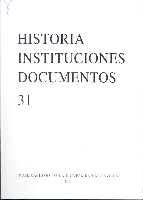
Historia Instituciones Documentos
Illuminating the Threads of History and Society.Historia Instituciones Documentos is a distinguished scholarly journal published by UNIV SEVILLA, EDITORIAL, specializing in Cultural Studies, History, Law, and Sociology and Political Science. Since achieving Open Access status in 1974, this journal has made significant contributions to the dissemination of research and discourse in its fields. With a robust reputation evidenced by its impressive Q1 rankings in both Cultural Studies and History for 2023, it has emerged as a vital resource for researchers and professionals seeking insights into historical documents and institutional analyses. The journal's commitment to high academic standards is reflected in its Scopus rankings, placing it respectively in the 60th percentile for History and in the 49th percentile for Cultural Studies. Situated in Seville, Spain, it invites a global readership to engage with its rich tapestry of scholarly articles, fostering interdisciplinary dialogue and advancing knowledge. Scholars, students, and practitioners will find Historia Instituciones Documentos to be an indispensable addition to their research repertoire.
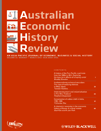
AUSTRALIAN ECONOMIC HISTORY REVIEW
Advancing Insights into Australia's Economic Journey.The Australian Economic History Review, published by Wiley, is a premier journal dedicated to advancing the field of economic history through rigorous research and insightful analyses. With an ISSN of 0004-8992 and an E-ISSN of 1467-8446, this journal has established itself as a critical resource for scholars and practitioners alike, with a notable Scopus ranking that places it in the 85th percentile among History journals and provides a complementary perspective in Economics and Econometrics fields. Since its inception in 1974, it has provided a platform for innovative research, fostering discussions that span Australian economic developments and their global contexts. Although it offers limited Open Access options, the journal remains a vital source of information for those seeking to understand the intricate dynamics of economic processes through historical lenses. Researchers, professionals, and students are encouraged to engage with the rich content that contributes significantly to both academic scholarship and practical implications in economic historiography.
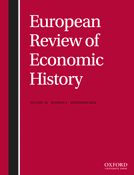
European Review of Economic History
Pioneering Research in European Economic NarrativesEuropean Review of Economic History is a premier academic journal published by Oxford University Press, dedicated to advancing the interdisciplinary understanding of economic history from a European perspective. With an impact factor that solidifies its standing in the realm of economics, the journal is distinguished by its Q1 category rankings in both Economics and History for 2023, placing it among the top-tier publications in its field. Established in 1999, it has consistently provided a platform for rigorous research, encompassing empirical studies, theoretical discussions, and insightful case analyses that illuminate the complex interplay between economics and historical development. While the journal operates under a traditional subscription model rather than an open-access framework, it remains integral for scholars and students seeking to deepen their knowledge of economic transitions and policy impacts throughout European history. With its strong reputation reflected in its Scopus rankings, European Review of Economic History plays a vital role in fostering academic discourse and advancing scholarship in this essential area of study.
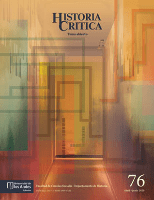
Historia Critica
Empowering Academics with Open Access KnowledgeHistoria Critica is a distinguished academic journal published by UNIV ANDES in Colombia, focusing on the interdisciplinary fields of Cultural Studies, History, and Geography. With an impressive impact factor driven by its robust ranking—Q1 in Cultural Studies and History, as well as notable placements in Geography, Planning and Development, and Social Sciences—this journal is an essential resource for researchers, professionals, and students alike. Since its inception in 1989, Historia Critica has committed to providing Open Access content, allowing for a wider dissemination of scholarly work and fostering collaboration among academics globally. The journal aims to encourage critical discourse and innovative research by publishing significant studies that explore the complexities of cultural and historical narratives. Operating from its headquarters in Bogota, Colombia, the journal continues to play a vital role in advancing scholarship in its respective fields, making it an invaluable asset for those seeking to deepen their understanding of cultural dynamics and historical perspectives.

Boletin Americanista
Diving Deep into the Rich Tapestry of the AmericasBoletin Americanista is a distinguished open access journal published by Universitat de Barcelona, Servei Publicacions, providing a vital platform for scholarly discourse in the field of history since its inception in 1959. With its ISSN 0520-4100 and E-ISSN 2014-993X, this journal has consistently catered to researchers, professionals, and students interested in American studies, offering rich analyses and critiques that span various historical contexts. As of 2023, it has achieved an admirable Q2 ranking in the category of History and holds a respectable rank of #997 out of 1760 arts and humanities journals, situating it within the 43rd percentile of Scopus rankings. Located in Barcelona, Spain, the journal serves a global audience, promoting the dissemination of knowledge through free access, thereby fostering an inclusive academic community. The convergence of diverse perspectives from 2011 to 2024 makes it a crucial resource for anyone engaged in the historical analysis of the Americas.
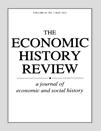
ECONOMIC HISTORY REVIEW
Unlocking the Secrets of Economic Development Through History.Economic History Review, published by Wiley, stands as a premier journal in the realms of Economics and Econometrics and History, established in 1927 and converging its reach through 2024. With an impressive impact factor reflected in its tier placements—Q1 in both Economics and History categories as of 2023—this journal provides critical insights and comprehensive analyses that advance understanding of economic historical developments. It is recognized in the Scopus Rankings with notable standings in the Arts and Humanities (Rank #25/1760) and Economics (Rank #259/716), placing it in the top percentiles in these fields. Although not an open access journal, it offers various subscription options, ensuring a broad dissemination of valuable research. The Economic History Review appeals to a diverse audience including researchers, professionals, and students eager to explore the intricate relationships between economic phenomena and historical contexts.

Revista Complutense de Historia de America
Delving Deep into America's Rich Historical HeritageRevista Complutense de Historia de America, published by the Universidad Complutense de Madrid, is a pivotal academic journal dedicated to the exploration and analysis of historical narratives and events pertaining to the Americas. With an ISSN of 1132-8312 and an E-ISSN of 1988-270X, this peer-reviewed journal has been contributing to the field of history since its inception in 1996 and continues to be an essential resource for scholars aiming to deepen their understanding of historical developments in the region. As a member of the Scopus database, the journal holds a category quartile of Q3 in 2023, positioning it within the competitive landscape of academic historical research, while also ranking at 1205/1760 in Arts and Humanities History, reflecting its impact within the discipline's scholarly community. Although it does not currently offer Open Access, the journal remains committed to disseminating rigorous historical research. Researchers, professionals, and students interested in the complexities of American history will find this journal a valuable repository of knowledge, fostering insightful discussions and scholarly advancements.

HISTORIA MEXICANA
Preserving and Promoting Mexico's Historical LegacyHISTORIA MEXICANA is a prestigious academic journal published by the COLEGIO DE MEXICO CENTRO DE ESTUDIOS HISTORICOS that has been an open access resource since its inception in 1967. With an ISSN of 0185-0172 and an E-ISSN of 2448-6531, the journal serves as a vital platform for scholars dedicated to the exploration of historical studies, particularly focusing on Mexico and its broader context within Latin American history. As a testament to its scholarly impact, HISTORIA MEXICANA is ranked in the Q3 category in History according to the 2023 metrics and holds a Scopus rank of #582 out of 1760 in Arts and Humanities. This journal not only fosters rigorous academic discourse but also provides a unique repository of knowledge, bridging gaps in historical research and inspiring future studies in the field. Researchers, professionals, and students alike will find this journal an invaluable resource for deepening their understanding of Mexico's rich and complex past.